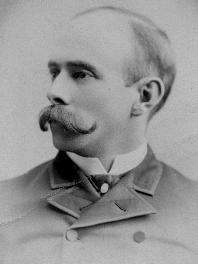Frank Selee
| Frank Selee | |||
|---|---|---|---|
 | |||
| Manager | |||
|
Born: October 26, 1859 Amherst, New Hampshire | |||
|
Died: July 5, 1909 (aged 49) Denver, Colorado | |||
| |||
| MLB debut | |||
| April 19, 1890, for the Boston Beaneaters | |||
| Last MLB appearance | |||
| June 27, 1905, for the Chicago Cubs | |||
| MLB statistics | |||
| Games | 2180 | ||
| Win Loss-Record | 1284 – 862 | ||
| Winning % | .598 | ||
| Teams | |||
| Career highlights and awards | |||
| |||
| Member of the National | |||
| Inducted | 1999 | ||
| Election Method | Veteran's Committee | ||
Frank Gibson Selee (October 26, 1859 – July 5, 1909) was an American Major League Baseball manager in the National League (NL). In his sixteen-year Major League career, he managed the Boston Beaneaters for twelve seasons, and the Chicago Orphans/Cubs for four.
He was noted for his ability to assess and utilize talent, which gave his teams a great opportunity to be successful. His success is measurable in that he won five NL titles with the Beaneaters, including three years in a row from 1891 to 1893. After he left Boston, he went on to manage in Chicago where he built the basis for the Cubs' later success by signing and utilizing the talents of Frank Chance, Joe Tinker, and Johnny Evers. He was elected to the Baseball Hall of Fame in 1999 for his managerial achievements.
Career
Selee was born in Amherst, New Hampshire.[1] He has been described as a "balding little man with a modest demeanor and a formidable mustache that gave his face a melancholy cast",[2] and shy and reticent in public. He left a factory job in Waltham, Massachusetts, in 1884 to form a minor league team. His was success in the minors, which led his eventual move to the Major Leagues in 1890.
Noted for having a keen ability to assess talent,[3] Selee managed the Boston Beaneaters (1890–1901) and the Chicago Cubs (1902–1905). His Beaneaters captured five NL pennants during his tenure (1891–93, 1897–98). His 1892 team, aided by the first 150-game schedule in history, became the first team to win 100 games in a season.
With the Cubs, he created the famous Tinker to Evers to Chance infield combination, by converting Frank Chance from catcher to first base, Joe Tinker from third base to shortstop, and Johnny Evers from shortstop to second base.[2] In all, twelve of his players went on be inducted into the Baseball Hall of Fame.[2]
In June, 1905, he became too ill to manage and surrendered his team to Chance, who went on lead the Cubs to four National League titles and two World Series victories.[4] The last Cubs' title under Chance in 1910,[4] eight of top thirteen players from the 1905 team were still major contributors.[2] In total, he had 1,284 victories in 2,180 games as manager during his 16-year career, with a winning percentage of .598.[1]
Post-career
Selee died of consumption (tuberculosis) at the age of 49 in Denver, Colorado,[3] and was interred at Wyoming Cemetery in Melrose, Massachusetts.[1] In 1999, he was elected to the Baseball Hall of Fame by the Veterans Committee for his achievements as a manager.[5] He is one of only two people from New Hampshire to inducted into the Hall of Fame.[6] The other was Carlton Fisk, who was enshrined in 2000.[7]
Cultural references
Selee appeared as a character in the 1991 episode "Batter Up" of the animated Back to the Future series, which involved Marty McFly and the Brown children traveling back to 1897 to help one of Marty's ancestors, a player for the Beaneaters, to improve his game. He was portrayed without his well-known mustache.
References
- 1 2 3 "Frank Selee's career statistics". retrosheet.org. Retrieved 2008-12-17.
- 1 2 3 4 "The Ballplayers: Frank Selee". baseballlibrary.com. Retrieved 2008-12-17.
- 1 2 "Frank Selee's Obituary". The New York Times, Tuesday. July 6, 1909. Archived from the original on April 19, 2008. Retrieved 2008-12-17.
- 1 2 "Frank Chance's managerial statistics". baseball-reference.com. Retrieved 2008-12-17.
- ↑ "Frank Selee's Biography". baseballhalloffame.org. Archived from the original on August 29, 2007. Retrieved 2008-12-17.
- ↑ "New Hampshire Historical Society". nhhistory.org. Retrieved 2008-12-17.
- ↑ "Carlton Fisk's career statistics". baseball-reference.com. Retrieved 2008-12-17.
External links
- Frank Selee at the Baseball Hall of Fame
- Baseball-Reference.com – managerial statistics and analysis
- Frank Selee at Find a Grave